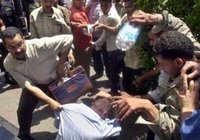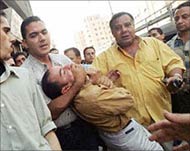Egypt in Human Rights Watch World Report 2006
 Human Right Watch World Report 2006 was released yesterday and I could not miss the Egypt part. I have to admit that the report of HRW World Report 2006 is giving Egypt its due respect in a succint manner.
Human Right Watch World Report 2006 was released yesterday and I could not miss the Egypt part. I have to admit that the report of HRW World Report 2006 is giving Egypt its due respect in a succint manner.Emergency Rule: President Hosni Mubarak’s renewal to Emergency law or instituting what he termed “a firm and decisive law that eliminates terrorism and uproots its threats.”
Political Violence and Internal Security: The State Security Investigation (SSI) arm of the Ministry of Interior carried out mass arbitrary arrests in and around al-`Arish, the North Sinai commercial and administrative center, detaining an estimated 2,500-3,000 persons.
Security forces arrested several suspects in the days following Sharm El Sheikh attack, in late August they detained an estimated 500-600 persons in a sweep of the mountainous Jabal Halal area of northern Sinai. As of late October 2005 the government had not provided information about whether any of the hundreds arrested had been released or charged in connection with the attack.
In April, three separate shooting and small explosives attacks in Cairo resulted in the deaths of three tourists, as well as the attackers, and injured more than a dozen persons, mostly Egyptian. The U.S. military command in Iraq said in October that 78 Egyptians, the largest number from any single country, were among the 312 foreign fighters captured thus far while allegedly taking part in the insurgency there.

Torture
Security forces and police routinely torture and mistreat detainees, particularly during interrogations. Torture in the past was used primarily against political dissidents, but in recent years it has been rife in police stations as well, affecting ordinary citizens. In 2004 the Egyptian Organization for Human Rights (EOHR) reported 292 known torture cases between January 1993 and April 2004, 120 of which resulted in the death of the suspect or prisoner. According to EOHR, there were at least seventeen additional cases of deaths in police or security force custody between May 2004 and July 2005. Human Rights Watch and Egyptian human rights organizations documented credible allegations of torture during interrogation from many persons detained following the Taba bombing.
Restrictions on Freedom of Association and Freedom of Expression.
Ill-treatment of Street Children:
The government periodically conducts arrest campaigns of homeless or truant street children who have committed no crime. In custody many face beatings, sexual abuse, and extortion by police and adult suspects, and police deny them access to food, bedding, and medical care. The authorities do not routinely monitor conditions of detention for children, investigate cases of arbitrary arrest or abuse in custody, or discipline those responsible. In many cases, the police detain children illegally for days before taking them to the public prosecutor on charges of being “vulnerable to delinquency.”
Women’s Rights:
Discriminatory personal status laws governing marriage, divorce, custody, and inheritance have institutionalized the second class status of women in the private realm and undermined their legal standing. The penal code does not effectively deter or punish domestic violence, and police are routinely unsympathetic to the concerns of battered women and girls.

Religious Intolerance and Discrimination against Religious Minorities.
Key International Actors:
The report about Egypt is highlighting and applauding international efforts led by the US, EU and UN for condemning Egypt’s violations of human rights and pressing them to exert more to show credibility.
Me, Concluding:
I have two things to say, first, that on behalf of myself and I am sure many others I want to thank Human Rights Watch for bringing Egypt’s critical human rights issues into the light and for the continuous follow-up in 2005 on key events. The second thing which is funny and pathetic at the same time that as usual some smart Egyptians could not realize that when they refer to HRW World Report that they need to look into Egypt’s record in stead of linking or writing about the US only as if the whole report is written about the US. Which is important or closer to us? The US or Egypt? Get the full report here. http://www.hrw.org










0 Comments:
Post a Comment
<< Home